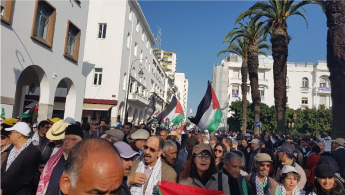Thousands rally in Morocco against Trump's so-called Mideast 'peace plan'
Carrying Palestinian flags, the demonstrators, including local politicians and trade unionists, marched in Rabat chanting "Long Live Palestine".
They called for a boycott of American products, denouncing the United States as "enemies of peace" and chanted "Palestine is not for sale".
Some of the demonstrators, who wore red-black-green-white scarves in the colours of the Palestinian standard, torched an Israeli flag and spoke against any attempt by Morocco "to normalise" ties with the Jewish state.
Morocco has warming but quiet relations with Israel, although they do not enjoy formal diplomatic ties.
Israel and Morocco opened "liaison" offices in each other's countries in the mid-1990s but Rabat closed them after an escalation of Palestinian-Israeli violence in 2000.
Last month US President Donald Trump unveiled a Middle East plan for peace between Israel and the Palestinians which the Palestinians have rejected saying it is biased in favour of the Jewish state.
Under the plan, Israel would retain control of the disputed city of Jerusalem as its "undivided capital", and annex settlements on Palestinian lands. Palestinians however want all of east Jerusalem to be the capital of any future state.
Twitter Post
|
The plan has also been rejected by the Arab League and the Organisation of Islamic Cooperation - two bodies in which Morocco is a prominent member.
After Trump unveiled the plan, the foreign minister of Morocco, a key US ally, said Rabat "appreciates the constructive efforts for peace deployed by the US administration for a durable solution in the Middle East".
Nasser Bourita went on to reiterate that Morocco's position is to support the creation of an independent Palestinian state with east Jerusalem as its capital.
Drawing up plans
Israel began drawing up maps of land in the occupied West Bank it plans to annex under a plan proposed by US President Donald Trump, Prime Minister Benjamin Netanyahu said on Saturday.
"We are already at the height of the process of mapping the area that, according to the Trump plan, will become part of the state of Israel. It won't take too long," Netanyahu said during a campaign rally in the Maale Adumim settlement according to Reuters.
The Israeli premier reaffirmed that Israel plans to annex all Israeli settlements, as well as the Jordan Valley - a highly fertile area that makes up around a third of the occupied West Bank.
Read also: Sudan protesters reject normalisation with Israel following Burhan-Netanyahu meeting
The West Bank has been under Israeli military occupation since 1967.
While settlements are widely considered illegal under international law, Trump's plan pushes for their annexation into Israel proper - an act that, with the seizure of the Jordan Valley, would leave the future Palestinian state with a scattering of disconnected territories.
"The only map that can be accepted as the map of Palestine is the map of the Palestinian state on the 1967 borders with Jerusalem as its capital," said Nabil Abu Rdainah, spokesman for Palestinian President Mahmoud Abbas.
Trump's so-called "Deal of the Century" plan calls for Israel to have an "undivided" capital in Jerusalem, with Palestinians allowed a much smaller capital in the eastern suburbs of Jerusalem that have already been cut off from the city by the seperation wall.
The plan's call for annexing much of the West Bank has been widely condemned, with many comparing it to the bantustans created under the Apartheid regime in South Africa.
This demilitarised Palestinian state - consisting of disconnected parts of the West Bank, Gaza Strip and Negev desert - would also be subject to complete Israeli control over its security.
Netanyahu had initially pledged to immediately start work on annexation plans, but prospects for the move under the current caretaker administration are unclear.
The prime minister, indicted on corruption charges, is currently campaigning to win a fifth term in office on March 2, when Israel will hold its third national election in a year.
Netanyahu faces pressure from his right-wing voter base to make good on his repeated annexation promise.
Follow us on Facebook, Twitter and Instagram to stay connected





 Follow the Middle East's top stories in English at The New Arab on Google News
Follow the Middle East's top stories in English at The New Arab on Google News

![Israeli forces ordered bombed Gaza's Jabalia, ordering residents to leave [Getty]](/sites/default/files/styles/image_330x185/public/2176418030.jpeg?h=a5f2f23a&itok=_YGZaP1z)
